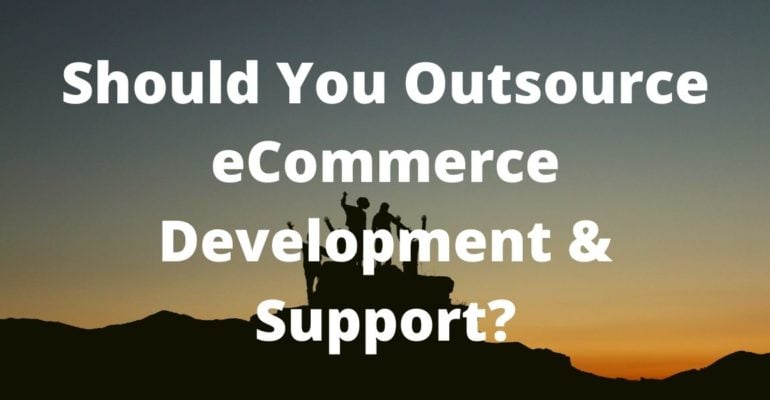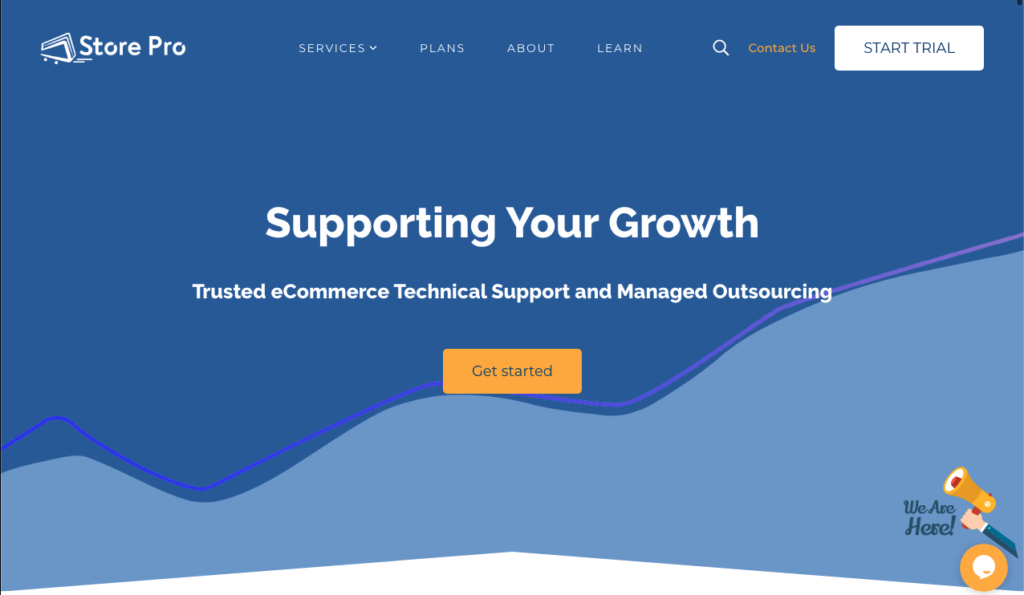The Benefits of Outsourcing Ecommerce Tasks In Your Business
The Benefits of Outsourcing Ecommerce Tasks In Your Business

Outsourcing eCommerce and associated tasks is a complicated business practice that has many different definitions and comes in many different forms.
One thing is certain: it’s one of the most effective ways for small eCommerce businesses to cut costs and become more efficient, which are two things you’ll need if you want to stay competitive.
In this article, we’re going to describe the benefits of outsourcing and what it can do for your business’ finances, revenue and workflow. We’ll also take a look at a few disadvantages of outsourcing to counterpoint a few of the advantages we’ll be covering.
First, let’s go over the many different definitions and formats we mentioned before.
Our Articles Are Guaranteed Independent With NO Affiliate Links 🙂
What is eCommerce Outsourcing?
eCommerce outsourcing is the practice of using third-party companies, products and services to create goods and provide services.
The term “outsourcing” typically refers to tasks usually performed by in-house staff. With an eCommerce business, these tasks can include things like writing product descriptions, handling support tickets, website development, technical support, marketing, and more – sometimes even handing the complete responsibility of eCommerce to a third party.
Many e-commerce businesses outsource to cut current costs or save on new resources they want to add to their workflows when they can’t afford or don’t wish to hire dedicated employees. Outsourced labor can be domestic or international with both practices sparking debates on the ethics of outsourced work.
Outsourcing vs Insourcing
While outsourcing is the practice of hiring third-party labour, “insourcing” is the term to use when referring to the practice of using in-house labor to perform tasks.
Let’s use an eCommerce business that only operates online as an example. The departments this type of company has typically includes administration, web development, product management, inventory, shipping, marketing, sales and customer service.
If you break down one of these departments, let’s say administration, you’ll find a variety of different tasks it’s responsible for, from employee management and payroll responsibilities to accounting and human resources. Smaller stores may have the business owner and one other employee handle these tasks, but eventually, all businesses need to hire an individual or an entire department to handle each task.
This is when the owner of the eCommerce business must decide whether they want to outsource or insource the task. They can insource an accountant if this task has become too overwhelming for the business owner to handle themselves. While more expensive, in-house employees are much easier to keep track of, and there will never be a time where their services aren’t available save for illness.
However, it may make more sense to outsource this task in cases where the business doesn’t produce enough accounting data to justify hiring a full-time employee.
Outsourcing vs Offshoring
There’s another practice businesses use to cut costs. It’s called “offshoring,” and it refers to the practice of moving a department or your entire business operations to another country. Many consumers and business owners alike often confuse it with outsourcing by automatically thinking companies who outsource only outsource jobs to other countries. In actuality, outsourcing and offshoring are entirely different business practices, though you can certainly combine the two.
Offshoring is often practised by businesses who sell their own products. The costs of manufacturing and everything related to it are quite high in many western countries, prompting many companies to move operations to countries like Mexico, China and Taiwan where labor costs are cheaper.
Businesses can utilize both practices by outsourcing certain tasks, including manufacturing and customer service, to third-party companies outside of their own countries. Both are done to cut costs, but combining the two is often far cheaper.
The Ethics of Outsourcing eCommerce Jobs
The benefits of outsourcing are prevalent and often necessary in the world of eCommerce. Unfortunately, the business practice has sometimes received criticism from consumers despite this. The majority of criticism is aimed at businesses who engage in offshore outsourcing of factories and call centres, though outsourcing in general is frowned upon by some.
Much of the criticism directed at offshore outsourcing has to do with the implications of it, including the working conditions of the factories you use, the labor laws of the countries you outsource to and the condition of your country’s economy.
The discourse on the ethics of outsourcing jobs domestically is centered around the treatment of the employees themselves. Opposers claim this form of labor prevents employees from receiving higher wages, benefits and job security.
Contrary to these believes, outsourcing can boost the economies of all countries involved while saving and creating jobs. Some companies aren’t in a position to hire full-time employees for a variety of different reasons. These companies are at risk of operating at a competitive disadvantage, which can lead to a drop in revenue and eventually the cutting of jobs.
Furthermore, outsourcing can create jobs in the company itself as well as the country that company operates in. When business owners are able to outsource things like accounting and payroll services, they can dedicate more of their time and resources to improving the business through research and development. This can lead to boosts in a store’s revenue, which the company can use to hire more full-time workers.
Finally, when companies cut costs by outsourcing and offshore outsourcing, they’re able to transfer those savings over to consumers through cheaper product prices and shipping charges. It’s basic economics from that point: when customers are able to save money, they’re able to spend more. When other companies receive more revenue from this, they’re able to create more jobs.
Why Do Companies Choose to Outsource Work?
We’re going to dive deeper into the benefits of outsourcing in the next section, but let’s talk about why companies choose to outsource work for now. It mainly boils down to two reasons.
Outsourcing saves businesses money. As an eCommerce business, you can save money by outsourcing accounting, web development, technical support, administration, marketing and even shipping tasks to third parties. This gives you the opportunity to spend that money on other things, such as benefits for current employees, additional employees, better offices, more offices, marketing campaigns and more.
The other reason is time. Outsourcing gives you, the business owner, more time to focus on tasks that will help you grow and expand the business as a whole. It can also lead to a better quality of life for you and current employees as it’ll remove a few tasks from everyone’s daily list of responsibilities.
The Benefits of Outsourcing
Now that you know what outsourcing is and what it isn’t, let’s talk about what it can do for your ecommerce business. I’ll expand on two benefits we’ve mentioned a few times already—saving time and money—before touching base on a few additional advantages you’ll experience.
However, everything has its downsides, which is why we’ll be getting into the pros and cons of outsourcing by discussing the disadvantages you may experience while using this business practice.
The Advantages of Outsourcing eCommerce Tasks
-
Save Money
This is the biggest motivator for allocating tasks to companies and contractors outside of an in-house workforce. Employees require a full salary, benefits, taxes and time to train. You may also need to set up a new office or an entirely new department depending on the task that needs to be outsourced.
Without outsourcing, your options are to continue handling the task yourself, pass off the task to an employee, which will only add to their workload and negatively impact their efficiency, or hire a new employee.
You may find yourself cutting costs in other ways with the latter option. This may involve cutting hours for current employees or spending less on resources for the website and things like shipping materials. Employee morale will decrease over time, and the little things you do to cut costs will likely impact customers at some point down the line.
With outsourcing, you can allocate certain tasks you and your employees don’t have the time or skill for now without needing to cut costs in other parts of your business.
-
Save Time
Outsourcing eCommerce tasks saves you and your employees time, as stated before. When you as the business owner are able to outsource tasks, you’re able to focus more of your time on customer research, development, outreach and other things that’ll help grow your brand’s influence.
When your employees are able to save on time, they’ll be much more efficient with the tasks they were originally hired to do. You’ll see a boost in productivity and morale all around, which will eventually turn into more sales and satisfied customers. Employees won’t be so quick to cut corners as well, leading to fewer urgent support tickets and less support requests overall.
-
Choose from a Larger Selection of Candidates
When you only onboard in-house employees, you’re limited to a small pool of job candidates. This is especially difficult when you’re looking for a particular skill or credential but can’t find a local job candidate with either.
When you outsource, you’re able to open your search to a wider selection of candidates from all around the world. You’ll be able to grow your store’s sales and marketing potential with candidates experienced in SEO marketing, advertising, blogging, technical development and more.
You can even use remote outsourcing to prequalify candidates who may be willing to move and become full-time employees at your base of operations. This allows you to find new talent in that larger selection of workers without needing to commit by offering them a full-time gig.
-
Enjoy a More Flexible Hiring Process
You’ll mainly find yourself outsourcing tasks you need performed year-round but not often enough to justify hiring new employees. However, there will be times where you’ll need short-term help as well. This is the case for projects that have expiration dates and seasonal work.
For example, if you want to add 500 new products to your store, you’ll need someone to write optimized product descriptions for each. If you don’t normally add that many new products to the store at once, you’ll need to ask a few employees to take care of it on top of their daily tasks or take care of them yourself. Outsourcing, on the other hand, would allow you to hire a freelance copywriter or copywriting agency to handle the task as a one-off project.
As for seasonal work, the holidays are always busy time for retailers due to Black Friday, Cyber Monday and Christmas. You’ll receive more sales than you normally do, but this revenue boost is always coupled with more products to package and ship as well as more support requests to handle. Outsourcing eCommerce tasks may allow you to hire seasonal workers to cover the holiday rush with the money saved.
-
Stay Competitive
The free market both craves and breeds competition, and the internet has only invigorated this convention. You can work yourself and your crew around the clock all you want, but if you only accomplish the bare minimum of your quota every quarter without expanding, you’ll fall behind.
Outsourcing allows you to complete tasks more efficiently and take on new projects while spending less. This will allow you to keep up with competition without needing to hire new employees.
-
Earn More Revenue
One of the first and most basic aspects of business you’ll ever learn is the need to spend money to make money. After all, even if you own a dropshipping store that doesn’t stock and ship its own inventory, you still needed to pay for the domain, website, hosting, marketing and other startup costs when you launched the business.
This rule never changes no matter how successful you get. You’ll always need to spend money on products, hosting, employees, marketing and advertising to keep the business running. However, if you refer to that basic rule one more time, you’ll learn you need to spend more to earn more, which means expanding the number of products you sell, the types of products you sell and launching new marketing strategies, all of which cost, you guessed it, more money.
Outsourcing, as explained above, allows you to expand the business and take on more projects without needing to spend money on recruiting new employees. This will allow you to earn more revenue and a higher return on investment.
-
Start Projects Quicker
Recruiting and onboarding new employees is a long process. You need to find places to post job ads, interview candidates, determine which ones are most suited for the job and your company, and train them. This can be a long and arduous process if all you want to do is start a new project for your marketing strategy or reshoot all of your product images.
Outsourcing cuts right through this process and gives you immediate access to qualified candidates and agencies from around the world. You can get to work on your new project at a much more efficient rate, all while spending less.
-
Build Staff Members’ Individual Skills
You may be able to outsource perpetually without needing to eventually turn contract work into full-time jobs or outsource indefinitely. If you have employees work directly with outsourced labor, you may be able to have them learn and develop the skills you typically need to outsource.
This can be done with onsite and offsite contractors but is most effective with onsite workers who can teach employees new skills first hand.
-
Less Red Tape
Depending on our jurisdiction, hiring staff can be fraught with regulation and red tape. This can be especially problematic if your business fluctuates throughout the year and you need to up staff and down staff depending on demand. There can be a lot of regulation and process you need to follow in order to down size your headcount. However one of the advantages of eCommmerce outsourcing is that you can up staff and down staff without any associated red tape, This allows you to manage the ups and downs of your business year with greater speed and flexibility.
The Disadvantages of Outsourcing
1. Lack of Control
One of the biggest drawbacks you may experience while outsourcing eCommerce jobs is a lack of control over the tasks you allocate to third parties. They’re not your employees. Instead, you’ll operate in a business-to-business manner, so while you can certainly provide descriptions and leave feedback on how you want things done, you’re not able to manage these types of projects in the same way you could if they were performed by in-house employees.
Communication issues may also get in the way. You can talk to in-house employees directly or even call them on work phones if need be. They’re obligated to give you their full attention right on the spot during work hours.
Things are quite different when you outsource. A company or contractors’ other clients and daily tasks, internet connectivity issues, and even time zone are all things that can get in the way of your ability to communicate with them when you need to.
2. Working in Different Time Zones
Speaking of time zones, this can be one of the greatest challenges you’ll face when your eCommerce store outsources work to individuals and companies from around the world. Urgent messages and project updates may not receive instant replies and you may have to wait for a number of hours, depending on the time difference.
This increases the importance of planning and clear communication of expectations and time frames. It is also helpful to have some time crossover to communicate in real-time where ever possible.
Fortunately, outsourcing to different time zones does have its upsides, including being able to operate around the clock. When your in-house employees clock out, outsourced workers are clocking in overseas. This can help you finish projects at a much quicker rate and even offer 24/7 support to customers.
3. Issues with Employees
While you may outsource work to reduce some of the workload you and your employees face, you may run into a few issues when you bring third parties into the mix.
Employee morale is one example. Employees may not see the benefits of why their employers implement new strategies or move away from the way things are normally done. When you begin to outsource tasks they typically cover, you may confuse them.
Other employees may feel their jobs are being threatened by this new workforce. If their morale drops low enough, they’ll become less efficient over time. Some may overwork themselves as a way to compete with an outsourced workforce, which can lead to issues in quality and burnout.
Again as in dealing with time zones – communication is key, regular, planned and consistent communication.
4. Privacy Issues
Privacy is a major concern for businesses and consumers especially in the light of GDPR and increasing government regulation. When you outsource areas, such as payments, data storage and customer service, you’re inviting third parties to view your customers’ personal information.
You must ensure that the company you engage to outsource are trustworthy, GDPR compliant and take security seriously.
If you outsource research and development and manufacturing to offshore companies, privacy concerns will come in the form of potentially having product ideas and strategies stolen. Again choosing the correct e-commerce outsource partner is key.
Final Thoughts
Most businesses engage in some form of outsourcing, without even realising it and certainly, for most small to medium businesses, the benefits of outsourcing eCommerce tasks, outweigh the negatives. Still, you need to examine your business closely and decide whether or not it’s the right move for you. You should also consider all of the various tasks you may already be outsourcing to gain a sense of its value. You should also consider your Outsourcing partner carefully and focus on using trusted outsource partners
Start by breaking down the tasks you and your team are already responsible for to see if there are things you can outsource to third parties. Tasks you and your employees spend too much time doing should be prime candidates. Tasks you and your employees are either overqualified or underqualified for should be prioritized as well.
Next, determine which tasks and projects you’d like to implement in your business but don’t have the workforce to tackle.
Now that you know which tasks you want to outsource, do your research to determine how much outsourcing is going to cost. You may need to actually reach out to contractors and companies to find out this information.
Outsourcing with Store Pro
 Store owners cannot afford to have their time and money stripped away by technical issues, as this article clearly demonstrated. You can save yourself a few headaches when it comes to the technical aspects of running a WooCommerce store by outsourcing those tasks to us.
Store owners cannot afford to have their time and money stripped away by technical issues, as this article clearly demonstrated. You can save yourself a few headaches when it comes to the technical aspects of running a WooCommerce store by outsourcing those tasks to us.
We are a trusted outsource partner to eCommerce stores in the UK, US and Australia.
We offer dedicated staff for your ongoing eCommerce development or eCommerce support and administration needs. WooCommerce is our speciality :).
Contact Us today with your Outsource Requirements










 Shares
Shares